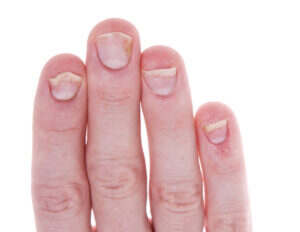The What, Why, Where and How of Psoriasis

The good news is psoriasis is not contagious, and it won’t spread to other parts of your body simply through contact. The bad news is there’s no “cure-all” solution. But with help, you can manage your condition and make it much easier to live with.
If you’ve just been diagnosed with psoriasis, you’re probably wondering what you need to know: what to watch out for, what foods to avoid, how you can manage your condition, and so on. Here are the facts on psoriasis.
What does psoriasis look like?
The condition affects 2.2% of Americans, and it can differ in appearance and symptoms, depending on the person, area of the body, and severity. In more mild cases, it presents as small spots of red, scaly skin. The skin can also be dry, flaky, cracked, and/or bleeding. In more severe cases, psoriasis can affect large areas of the body, making for big splotches of red skin covered in silvery-white scales. This is called plaque psoriasis. It can be itchy, sore, or burning, and can occur anywhere on the body, including inside the mouth and ears.

Most cases of psoriasis go through cycles – which means it will flare up for a few weeks to a few months, then go down for a while. Your symptoms may even go away completely for a period of time.
What causes psoriasis?
Psoriasis is an autoimmune condition, which means it’s a result of the body attacking itself. Your body’s white blood cells generally drive off infection by attacking bacteria and viruses, but when these white blood cells are hyperactive mistakenly when no threat is present, it causes the inflammation and skin build-up that results in psoriasis.
While scientists aren’t sure what causes psoriasis, we do know that it has to do with your immune system and your genetics. If you have it, your skin cells grow at an abnormally fast rate. When these cells build up too quickly, your skin becomes thick and scaly.
If you have a family member with psoriasis, then you may have a slightly higher chance of developing it yourself.
What triggers psoriasis flare ups?
Psoriasis isn’t contagious, and it won’t spread to other parts of the body simply through contact. But there are certain factors that trigger psoriasis flare ups. Let’s look at a few:
-
Factor 1: Stress
Just what you needed when you’re already under a lot of stress, right? Unfortunately, when you experience especially high stress levels, it can cause your psoriasis to worsen or spread. If this applies to you, you might want to experiment with stress management techniques like yoga, exercise, and soothing music.
-
Factor 2: Weather
The weather can affect psoriasis flare-ups. When it’s cold, your skin gets drier. And a lack of sunlight can affect your immune system, which means your skin cells will build up more quickly and your psoriasis will flare up.
But you don’t want too much sunlight, either. Be careful about exposing your skin to intense sunlight, especially in the summertime, as that can irritate your psoriasis. -
Factor 3: Alcohol and Diet
Consuming heavy amounts of alcohol can trigger a psoriasis flare up, as can certain foods. Some people with psoriasis are sensitive to gluten or dairy. Other foods that have been reported to worsen inflammatory conditions such as psoriasis are tomatoes, potatoes, refined sugar, and red and processed meats. Fried foods and junk food aren’t great, either. However, these dietary triggers aren’t the same for everyone, so it’s definitely worth experimenting before you completely throw dairy out the window.
-
Factor 4: Other triggers
For certain people, psoriasis can be triggered by medication, obesity, injury, infection, and dry skin.

How can you manage psoriasis?
It may be true that there’s no cure for psoriasis, but that doesn’t mean you can’t get your skin condition under control. Psoriasis treatment is different for everyone, which is why it’s important to see a dermatologist in order to truly start managing your psoriasis. But along with your treatment, there are certain things you can do to soothe and energize your skin:
-
Method 1: Take a bath
Extremely hot water can make your psoriasis worse, but taking a lukewarm bath every day helps reduce the scales. You can even try adding bath oils and colloidal oatmeal to the bath water if your skin is inflamed.
-
Method 2: Eat a healthy diet
As mentioned already, you might want to avoid gluten and dairy if you have psoriasis. Instead, make sure your diet is heavy in omega-3 fatty acids – which you can get from fish like salmon and mackerel, and anti-inflammatory vegetables like kale, spinach, broccoli, and avocados and nuts. Also, you might want to reduce your alcohol intake – as that can be a trigger for psoriasis.
-
Method 3: Exercise
Exercise is a good cure for a lot of things, and many people with psoriasis find that the condition goes down and their treatment becomes more effective after losing weight. In fact, studies have shown that exercising vigorously for just three hours a week has the potential to lower your risk of developing psoriasis. Aerobics and weight lifting tend to be the best forms of exercise for psoriasis patients. If you’re not used to exercising, start with a daily walking or jogging routine, and build up from there. Other good forms of exercise include biking, swimming, squats, and push-ups.
Sweat tends to aggravate psoriasis, so just to be safe, you should wear loose, light clothing when you exercise. Afterward, take a gentle shower, but don’t scrub too much, as that can make your condition worse.
-
Method 4: Light therapy
Many people find that light therapy keeps their psoriasis in check. The UV rays in sunlight suppress inflammation in the skin and thus helps to reduce the abnormal skin build up. At Schweiger Dermatology Group, we use a form of light therapy called XTRAC to treat psoriasis.

Complications of psoriasis
While psoriasis can be deeply frustrating and embarrassing, it’s not usually life-threatening. However, there are rare cases in which psoriasis can become dangerous. Erythrodermic psoriasis is an especially severe form of the skin condition, which can be life-threatening. It’s very rare, and generally only affects about 3% of psoriasis patients. When it does occur, it causes extreme redness and itching all over the body.

At the end of the day, the most important thing to know about your psoriasis is that if you’re careful about managing it and following the treatment routine your dermatologist gives you, you can still live a healthy, happy life – in spite of that annoying, itchy, dry and scaly skin.
Do you have psoriasis? We recommend scheduling an appointment with a Schweiger Dermatology Group provider to determine the best treatments for psoriasis. Call 844-DERM-DOC or email contact@schweigerderm.com.
